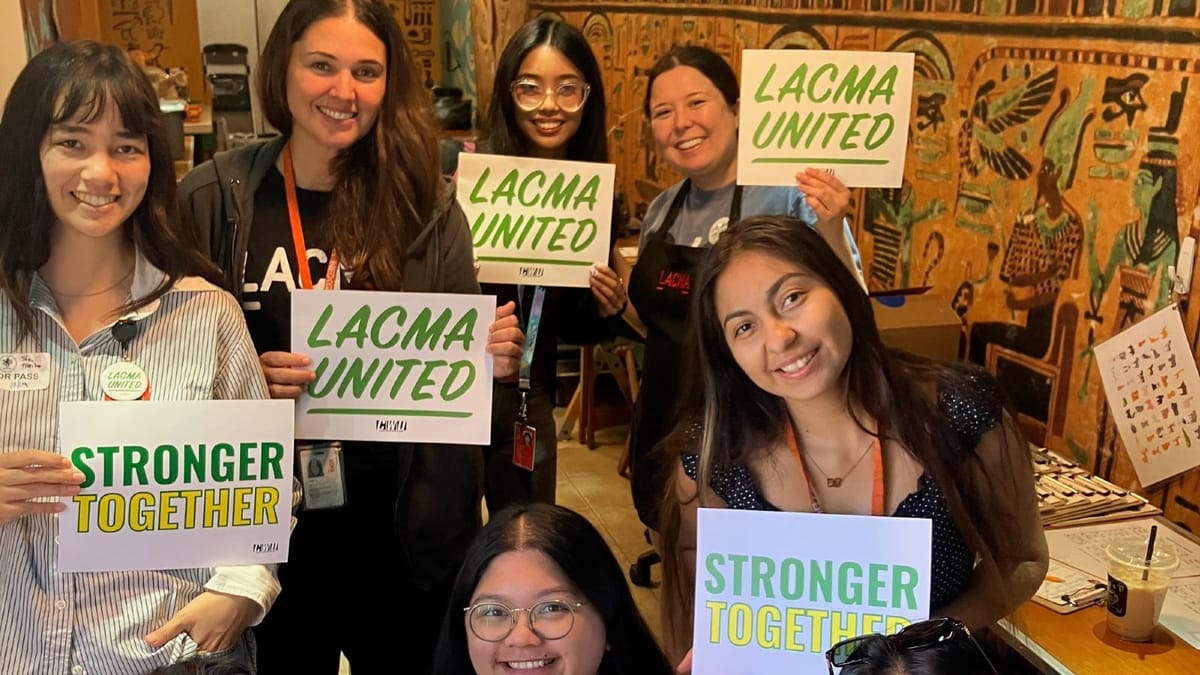
Workers at the Los Angeles County Museum of Art have organized to form a union called LACMA United to seek fairer pay and benefits, as well as greater transparency from museum leadership.
The workers presented museum leadership with a letter Wednesday and announced their intent to form LACMA United in a statement on Instagram, stating it would be organized under Cultural Workers United District Council 36 of the American Federation of State, County and Municipal Employees.
“Museum leadership has received the letter from LACMA United,” Michael Govan, LACMA’s director, said in a statement to ARTnews. “We are reviewing it carefully and very much look forward to continuing to support our amazing staff.”
In their letter, the LACMA United workers asked for the museum to voluntarily recognize their union by November 5.
The next step would be to begin collective bargaining, which would begin after agreeing on ground rules and scheduling, a process that can take up to several weeks depending on management’s cooperation.
“Regarding voluntary recognition, as you know we've requested a response by November 5,” a representative for the union in an email to Urgent Matter. “We're hopeful LACMA will respect our wishes as staff and the outpouring of support from our broader community.”
Aurora van Zoelen Cortés, a curatorial assistant for contemporary art at LACMA, said in a text message with Urgent Matter that the workers have not yet decided on precise pay or benefits details that they would be seeking.
Cortés said she found it “very exciting” when she heard that a major study by the organization Museums Moving Forward on labor concerns in the cultural sector was being released the same day as LACMA United announced its intent to form a union.
In that study, researchers found that nearly half of U.S. museum workers have job-hunted in the past year as burnout rises despite modest morale gains. Among the most cited reasons workers had considered leaving were low pay and a lack of advancement opportunities.
Museum staffers who hold union memberships reported feeling more dissatisfied with their institutions on all metrics than their nonunion counterparts, despite having higher pay and positively reviewing the impact of the union on their lives.
“I've heard from so many of my colleagues how they are truly invested in the value and impact of art for them and the community members they interact with,” she said.
“Our interest in organizing, and I expect this is true with other cultural workers, comes from wanting our museum to be the best it can be when it comes to serving and taking care of the collection and our community.”
When asked if there were areas beyond compensation and benefits where LACMA could improve, she noted that her colleagues felt their perspectives were not being adequately considered by museum leadership.
“One of our interests to form a union is to have a platform for our voices. In our conversations with our colleagues, many have relayed that they feel invisible or like they don't matter to the institution,” she said.
“There are two reasons that moved me to join the effort: I was inspired by the art that we exhibit in shows like ‘Pressing Politics and Act on It!,’ and the presentations by Judy Baca and Vincent Valdez. The other reason is that I felt unsettled when our development department was restructured last year and several colleagues were let go.”
Correction published 12:57 a.m. on December 18, 2025: An earlier version of this article misstated the labor framework governing the union election at the Los Angeles County Museum of Art. While union organizers said they had filed with the California Public Employment Relations Board, the election ultimately proceeded under federal jurisdiction after the museum filed a representation petition with the National Labor Relations Board on November 12, 2025. Workers voted in favor of union representation in a federally supervised election on December 16.
